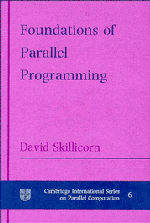Book contents
- Frontmatter
- Contents
- List of Figures
- Preface
- 1 The Key Idea
- 2 Approaches to Parallel Software Development
- 3 Architectural Background
- 4 Models and Their Properties
- 5 The Categorical Data Type of Lists
- 6 Software Development Using Lists
- 7 Other Operations on Lists
- 8 A Cost Calculus for Lists
- 9 Building Categorical Data Types
- 10 Lists, Bags, and Finite Sets
- 11 Trees
- 12 Arrays
- 13 Graphs
- 14 Conclusions
- A C++ Library for Lists
- B Historical Background
- References
- Index
B - Historical Background
Published online by Cambridge University Press: 25 October 2009
- Frontmatter
- Contents
- List of Figures
- Preface
- 1 The Key Idea
- 2 Approaches to Parallel Software Development
- 3 Architectural Background
- 4 Models and Their Properties
- 5 The Categorical Data Type of Lists
- 6 Software Development Using Lists
- 7 Other Operations on Lists
- 8 A Cost Calculus for Lists
- 9 Building Categorical Data Types
- 10 Lists, Bags, and Finite Sets
- 11 Trees
- 12 Arrays
- 13 Graphs
- 14 Conclusions
- A C++ Library for Lists
- B Historical Background
- References
- Index
Summary
Chapter 2 covers desirable model properties and shows how categorical data types satisfy these properties. I developed this view of model properties during 1992 (an early survey of models using them appeared as [179]) and extended and refined it over the next two years. A preliminary version of Chapter 4 was given as a talk at the Workshop on Programming Tools for Parallel Machines at Alimini, Italy, in the summer of 1993.
Chapter 3 is based on Valiant's work which can be found in a series of papers [197,199, 200]. The results on emulation on SIMD architectures appears in [178], although they seem to have been widely understood before that.
The construction of lists as a categorical data type in Chapter 5 follows the general presentation in Grant Malcolm's thesis [138]. An alternative presentation that emphasises the role of adjunctions in the CDT construction is due to Mike Spivey [189]. Much of the category theory on which this work depends was done in the Sixties [25]. The demonstration that lists can be efficiently implemented comes from [178].
The material on software development in Chapter 6 is a selection from a much larger range of material developed in what has become known as the Bird-Meertens formalism [17,31–35]. The material on almost-homomorphisms (and the name) come from work by Murray Cole [55].
The development of operations to compute recurrences (Chapter 7) and the cost calculus for lists (Chapter 8) is joint work by myself and Wentong Cai during 1992, when he was a postdoctoral fellow.
Information
- Type
- Chapter
- Information
- Foundations of Parallel Programming , pp. 177 - 178Publisher: Cambridge University PressPrint publication year: 1994
